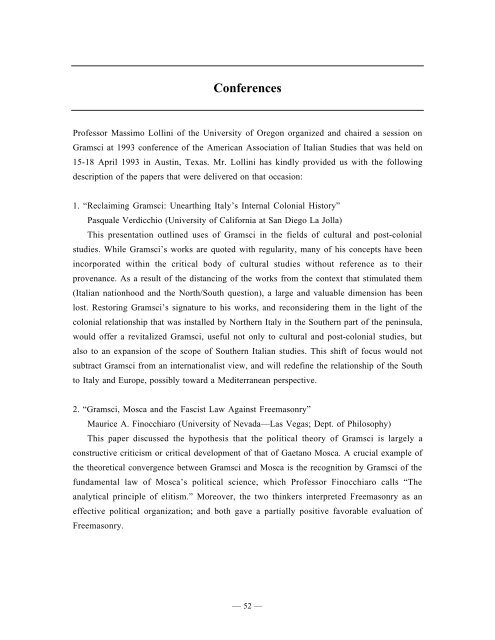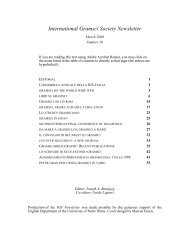Newsletter - International Gramsci Society
Newsletter - International Gramsci Society
Newsletter - International Gramsci Society
Create successful ePaper yourself
Turn your PDF publications into a flip-book with our unique Google optimized e-Paper software.
Conferences<br />
Professor Massimo Lollini of the University of Oregon organized and chaired a session on<br />
<strong>Gramsci</strong> at 1993 conference of the American Association of Italian Studies that was held on<br />
15-18 April 1993 in Austin, Texas. Mr. Lollini has kindly provided us with the following<br />
description of the papers that were delivered on that occasion:<br />
1. “Reclaiming <strong>Gramsci</strong>: Unearthing Italy’s Internal Colonial History”<br />
Pasquale Verdicchio (University of California at San Diego La Jolla)<br />
This presentation outlined uses of <strong>Gramsci</strong> in the fields of cultural and post-colonial<br />
studies. While <strong>Gramsci</strong>’s works are quoted with regularity, many of his concepts have been<br />
incorporated within the critical body of cultural studies without reference as to their<br />
provenance. As a result of the distancing of the works from the context that stimulated them<br />
(Italian nationhood and the North/South question), a large and valuable dimension has been<br />
lost. Restoring <strong>Gramsci</strong>’s signature to his works, and reconsidering them in the light of the<br />
colonial relationship that was installed by Northern Italy in the Southern part of the peninsula,<br />
would offer a revitalized <strong>Gramsci</strong>, useful not only to cultural and post-colonial studies, but<br />
also to an expansion of the scope of Southern Italian studies. This shift of focus would not<br />
subtract <strong>Gramsci</strong> from an internationalist view, and will redefine the relationship of the South<br />
to Italy and Europe, possibly toward a Mediterranean perspective.<br />
2. “<strong>Gramsci</strong>, Mosca and the Fascist Law Against Freemasonry”<br />
Maurice A. Finocchiaro (University of Nevada—Las Vegas; Dept. of Philosophy)<br />
This paper discussed the hypothesis that the political theory of <strong>Gramsci</strong> is largely a<br />
constructive criticism or critical development of that of Gaetano Mosca. A crucial example of<br />
the theoretical convergence between <strong>Gramsci</strong> and Mosca is the recognition by <strong>Gramsci</strong> of the<br />
fundamental law of Mosca’s political science, which Professor Finocchiaro calls “The<br />
analytical principle of elitism.” Moreover, the two thinkers interpreted Freemasonry as an<br />
effective political organization; and both gave a partially positive favorable evaluation of<br />
Freemasonry.<br />
— 52 —



